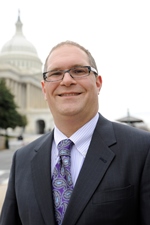Article first published online: July 17, 2015
David Figlio, Director, Institute for Policy Research, Northwestern University
What was the genesis of the idea for your research/paper?
My collaborators, Sarah Hamersma and Jeffrey Roth, and I published a paper in 2009 that demonstrated that prenatal WIC participation substantially improved children's birth outcomes. In the process of conducting that study, we noticed that there was a drop and rebound in prenatal WIC participation in the time surrounding welfare reform in the mid-1990s. We were intrigued by this pattern in the data, because welfare reform didn't affect WIC eligibility, and we suspected that there may be an information explanation for the temporary slowdown in WIC takeup. We then sought to find likely proxies for information networks, and the best measure we could think of involved looking at neighbors from the same cultural background. That's how we came to study WIC takeup among immigrants.
What is the main conclusion that becomes evident from your research? (Or, what is your main takeaway?)
Our main takeaway is that information appears to affect the takeup of social programs. Immigrant women in communities with lower densities of people from their cultural backgrounds took up WIC at significantly lower levels in the wake of welfare reform than did those in communities with higher densities of people from their cultural backgrounds. These findings withstand a considerable battery of sensitivity tests.
What are some of the more interesting or surprising findings/conclusions did you find in the process of bringing this together?
Some people are surprised to learn that specific location of origin makes such a big difference. But we find that place of origin matters a lot: Spanish-speakers from Cuba were more likely to take up WIC during the welfare reform era when they lived near more Cubans than they did when they lived near more, say, Puerto Ricans. Culture is much more than language, and the cultural background of pregnant women seems to have had a substantial influence on the degree to which they were able to participate in WIC during a period of considerable uncertainty.
Click here to view article
Author's Bio

David Figlio is the director of the Institute for Policy Research at Northwestern University, where he is also the Orrington Lunt professor of education and social policy and of economics. His research on education policy, health policy and public finance has been published in many leading journals and has been funded by the U.S. Department of Education; the National Science Foundation; the National Institutes for Health; and the Annie E. Casey, Bill & Melinda Gates, MacArthur, Spencer, and Smith Richardson foundations.
The president of the Association for Education Finance and Policy, Figlio serves as an editor of the Journal of Human Resources and an associate editor of several other leading journals. He has advised the governments of 10 states and 16 countries regarding education and health policy.